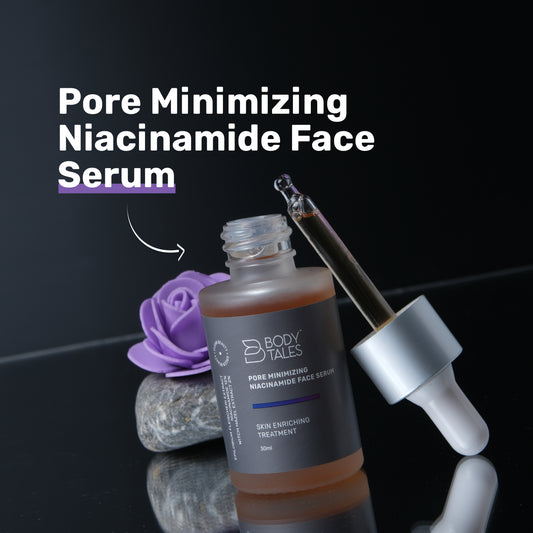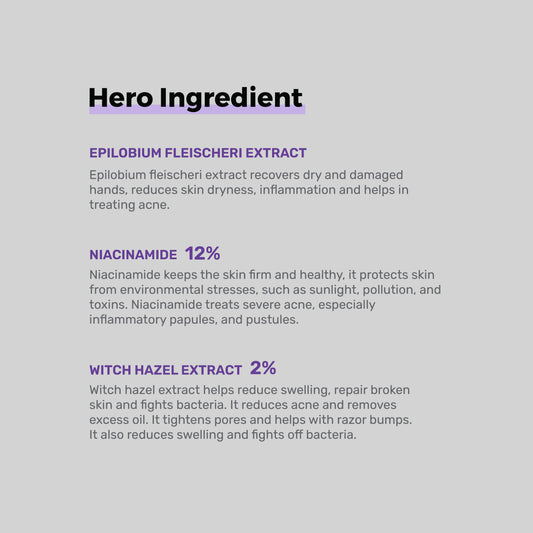How to Minimize Pores on Your Face Through Niacinamide

The function of pores is crucial to the health of the skin. They enable your skin to chill down, expel pollutants, and breathe. They maintain the skin’s health as a result.
On your skin, pores are microscopic openings for hair follicles.
Niacinamide is a substance in skincare products that is worth paying attention to, and your skin will appreciate you for using it. Niacinamide stands out among a select group of other fantastic skincare components, like retinol and vitamin C, due to its adaptability to virtually any skincare issue and skin type.

What causes Big Pores?
1. Ageing Related Loss Of Skin Elasticity
The ability of your skin to create vital skin proteins like elastin and collagen starts to decline as you age. This causes the skin’s suppleness to decline, which in turn causes the development of larger pores, wrinkles, and droopy skin.
2. Increased Production Of Sebum
Sebaceous glands found in your pores create sebum, an oleo-waxy material. According to research, excessive sebum production causes oily skin, larger pores on the face, and acne.
3. UV Radiation Exposure Without Protection
According to a study that was published in Clinical, Cosmetic and Investigational Dermatology, sun exposure is a major cause of increased pores on your skin.

What is Niacinamides?
Niacinamide, also known as vitamin B3 and nicotinamide, is a water-soluble vitamin that works with the substances in your skin to noticeably shrink enlarged pores, constrict lax pores, even out uneven skin tone, soften fine lines and wrinkles, lessen dullness, and fortify a weakened surface.
Niacinamide minimizes the impacts of environmental damage by strengthening the skin’s barrier —its first line of defense—and assisting the skin in repairing prior damage. If this type of everyday attack is not stopped, it ages, dulls, and dulls the skin.
For those who are interested, niacinamide has certain advantages. By this point, you’ve already realised that we’re rather impressed with what niacinamide can do for skin when it’s added to skincare products like toners, serums, and potent leave-on treatments. Niacinamide works best when paired with all of the skincare products you use, including those that contain retinol, peptides, hyaluronic acid, AHAs, BHAs, vitamin C, and different antioxidants.
Since all skin types tolerate this B vitamin well, you can use a variety of niacinamide-containing products in your routine without worrying about sensitivity. You can use it even if your skin is sensitive or prone to rosacea.
What benefits does Niacinamide provide for skin?
Niacinamide, also known as vitamin B3, has additional advantages for the skin, including boosting the skin’s natural production of ceramides, which protect the skin’s surface from moisture loss and drying. Over time, ceramide levels drop, leaving skin susceptible to a variety of issues, such as recurrent patches of dry, flaky skin and heightened sensitivity.
The exact mechanism by which this B vitamin minimize pores is yet unknown to science, but it does reduce the pores! Niacinamide appears to have a normalising effect on the pore lining, and this influence helps prevent debris from building up and clogging pores and causing rough, bumpy skin. You’ll notice larger pores as the clog develops and worsens because the pores have to expand to make up for the obstruction. Niacinamide use aids in the restoration of normalcy, allowing pores to regain their natural size. Additionally, sun damage can expand pores, resulting in what some refer to as “orange peel skin.” Higher niacinamide concentrations can aid in noticeably shrinking pores by strengthening the skin’s supporting structures.
How is Niacinamide used?
Finding fantastic skincare products that include niacinamide and other healthy elements like antioxidants, skin-restoring agents, and other skin-replenishing ingredients makes using it simple.
Niacinamide-containing products can also be applied to the area around your eyes. Some people may find that using a niacinamide-containing moisturiser or eye cream improves the appearance of under-eye circles, softens the appearance of crow’s feet, and helps this delicate area hold on to moisture that smooths the skin and resists losing firmness.
How long does Niacinamide take to work?
Do not expect your skin to be fully “pore less” because that is not feasible with any skincare product, but results will continue to improve over time (not to mention, your skin needs its pores for many vital functions). You might anticipate smaller-looking pores, more even skin tone, a dramatic reduction in fine lines and wrinkles, and an all-around healthier glow.
You shouldn’t wait to incorporate niacinamide into your skincare routine. This remarkably versatile B vitamin provides a number of topical benefits to improve skin’s appearance and make it look more even, youthful, and bright. Daily application of a broad-spectrum sunscreen with an SPF of 30 or more is essential for skin protection, just like with any other wonderful skincare element.
Tips and Suggestions
Apply your toners, serums, or chemical exfoliants on the skin after washing your face. Allow the skincare products to absorb fully at this point. Apply your niacinamide next, and then finish with a moisturiser.
But that doesn’t mean you have to adhere to this instruction to the letter. Since everyone’s skin is unique, you can modify the timing of your niacinamide usage in your routine as necessary. Apply the vitamin after toning if it’s in liquid form. As an alternative, you can use it in conjunction with or after your moisturiser or serum.



